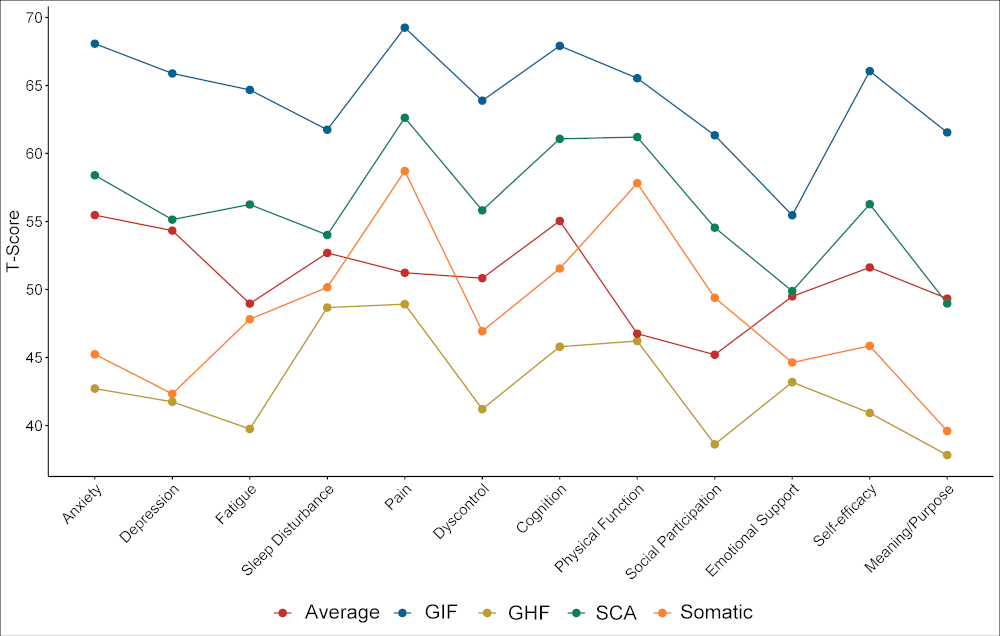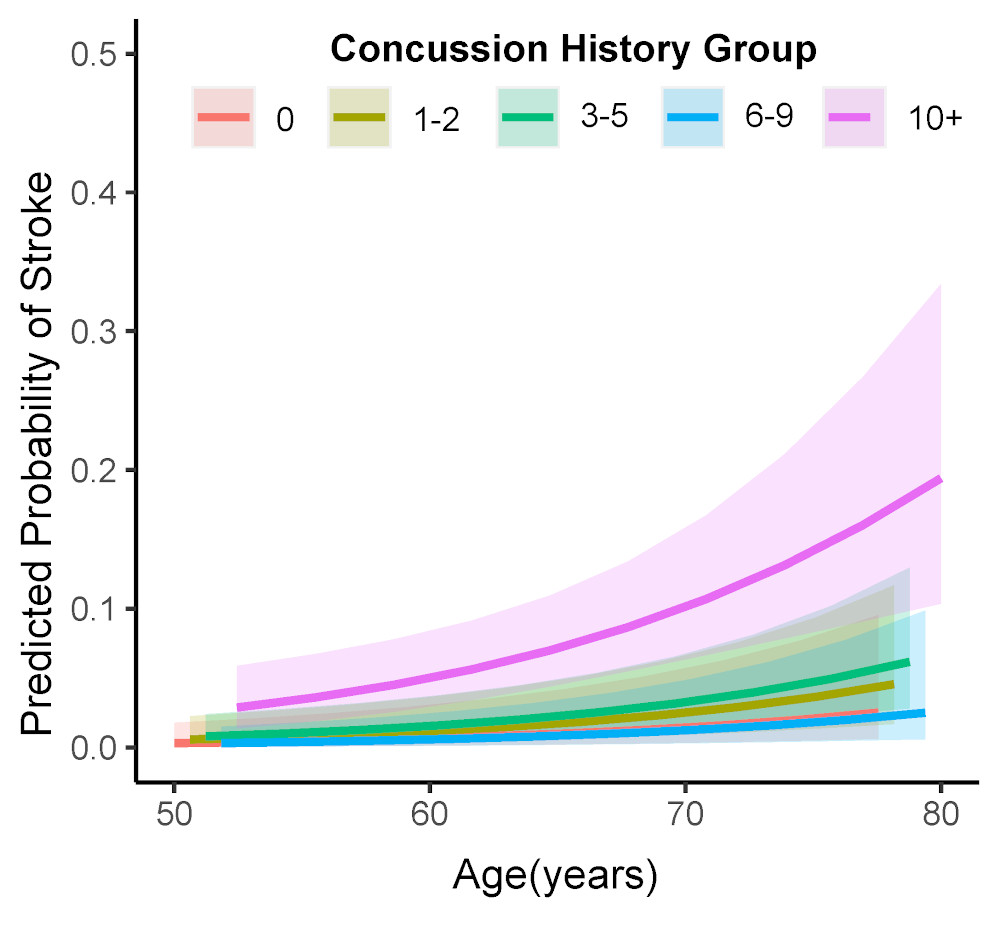Findings | Overview
2022
Lempke LB, Walton SR, Brett BL, et al. Relating American Football Age of First Exposure to Patient-Reported Outcomes and Medical Diagnoses Among Former National Football League Players: An NFL-LONG study [published online ahead of print, 2022 Dec 7]. Sports Med. 2022;10.1007/s40279-022-01795-9. doi:10.1007/s40279-022-01795-9
- Among former NFL players, age of first exposure (AFE) to football was weakly associated with self-reported symptoms of anxiety, depression, sleep disturbance, pain, and poor emotional/behavioral control.
- AFE to football was not associated with medical diagnoses of anxiety, depression, mild cognitive impairment, or dementia.
- Age had a greater independent association with self-reported function and diagnoses than AFE.
- Stakeholders (e.g., clinicians, individuals who have played football, family members) may not need to be overly concerned with the age they started playing football and their viewed cognitive and physical function.
Brett BL, Kerr ZY, Chandran A, et al. A dominance analysis of subjective cognitive complaint comorbidities in former professional football players with and without mild cognitive impairment [published online ahead of print, 2022 Aug 30]. J Int Neuropsychol Soc. 2022;1-12. doi:10.1017/S135561772200056X
- Anxiety and fatigue are the most robust factors associated with subjective cognitive difficulties (SCD) in former NFL players.
- Depression is greatly associated with endorsement of emotional and behavioral dyscontrol.
- The presence of comorbid contributing factors (depression, anxiety, sleep disturbance, pain interference, education, fatigue, life events, social, and/or concussion history) can influence self-reported cognitive complaints.
- A multidimensional assessment is needed to directly address cognitive symptoms/weaknesses for optimal treatment.

Figure 1. Radar plot of average contributions of SCD-associated factors of explained variance in self-report ratings of general cognition in MCI and non-MCI groups. Numerical scale of figure represents R2 value contribution of average SCD-associated factor. Z-score transformations revealed that the strength of the association (based on average contribution of variance explained via general dominance) between each SCD-associated factor and ratings of general cognition across MCI and non-MCI groups did not statistically differ (Zstatistics <1.96, ps>.05).
DeFreese JD, Walton SR, Kerr ZY, et al. Transition-Related Psychosocial Factors and Mental Health Outcomes in Former National Football League Players: An NFL-LONG Study. J Sport Exerc Psychol. 2022;44(3):169-176. Published 2022 Mar 12. doi:10.1123/jsep.2021-0218
- Often, NFL players are forced to stop playing football due to deselection (being cut) and injury. Thus, the decision to stop playing is not their choice.
- Former players who were forced to stop playing against their will have higher scores or measures of depression and anxiety.
- Planning for the transition out of professional football may aid in better mental health outcomes.
2021
Walton SR, Kerr ZY, Mannix R, et al. Subjective Concerns Regarding the Effects of Sport-Related Concussion on Long-Term Brain Health Among Former NFL Players: An NFL-LONG Study. Sport Med. 2021;(0123456789). doi:10.1007/s40279-021-01589-5
- Many players reported that their concerns regarding memory, thinking skills, and development of chronic traumatic encephalopathy (CTE) are more prevalent now compared to when they were playing football.
- Concussion history, racial identity, era of football play, years since leaving the NFL, and subjective reports of mood, physical functioning, and cognitive functioning all have unique relationships with brain health concerns.
- Cognitive and mental health concerns can be targeted by clinical intervention.
Brett BL, Kerr ZY, Aggarwal NT, Chandran A, Mannix R, Walton S, DeFreese J, Echemendia RJ, Guskiewicz KM, McCrea MA, Meehan III WP. Cumulative Concussion and Odds of Stroke in Former National Football League Players. Stroke. 2021;(November). doi:10.1161/STROKEAHA.121.035607
- The prevalence of stroke among former NFL players aged ≥50 years was lower than expected based on estimates from similar aged men in the general population.
- The risk of stroke was significantly higher among those with 10 or more concussions when compared to those with no prior concussions.
- These findings add to the evidence suggesting that traumatic brain injuries are associated with increased risk of stroke.
- Management of cardio- and cerebrovascular health may be particularly important to those with a history of multiple prior concussions.
Brett BL, Walton SR, Kerr ZY, Nelson LD, Chandran A, Defreese JD, Echemendia RJ, Guskiewicz KM, Meehan Iii WP, McCrea MA. Distinct latent profiles based on neurobehavioural, physical and psychosocial functioning of former National Football League (NFL) players: an NFL-LONG Study. J Neurol Neurosurg Psychiatry. 2021 Mar;92(3):282-290.
NFL-LONG researchers identified five distinct profiles of self-reported functioning in former NFL players.
- global higher functioning (GHF)
- average functioning (Average)
- mild somatic (pain and physical functioning) concerns (Somatic)
- somatic and cognitive difficulties with mild anxiety (SCA)
- global impaired functioning (GIF)
Former players in groups 4 and 5 reported the highest levels of medical/psychiatric conditions and psychosocial stressor levels, as well self-reported more lifetime concussions.
Interestingly, total years of participation was not significantly associated with group, although group 1, those with higher global functioning, reported the greatest total years of tackle football played.

Figure 2. The five latent profiles identified and their relative position on the respective LPA measures. (GHF) (LP1)=global higher functioning; average (LP2) functioning; somatic (LP3)=mild somatic (pain and physical functioning concerns); SCA (LP4)=somatic and cognitive difficulties with mild anxiety; GIF (LP5)=global impaired functioning. Measures include Patient Reported OutcomesMeasurement Information System (PROMIS)-29 domains Anxiety, Depression, Fatigue, Sleep Disturbance, Physical Functioning, Ability to Participate in Social Roles and Activities, and Pain Interference; PROMIS Cognitive Function Short-Form version 2.0, Emotional and Behavioral Dyscontrol-Short-Form version 2.0, General Self-Efficacy Short-Form version 1.0 and Meaning and Purpose Short-Form version 1.0; Neuro-QoL Emotional and Behavioral Dyscontrol Short-Form version 1.0. Standardized T-scored based on normative data obtaining within the general population (mean=50 and SD=10). Higher T-score equals greater dysfunction for all domains (measure reflecting positive functioning were inverted).
Walton SR, Kerr ZY, Brett BL, Chandran A, DeFreese JD, Smith-Ryan AE, Stoner L, Echemendia RJ, McCrea M, Meehan III WP, Guskiewicz KM. Health-promoting behaviours and concussion history are associated with cognitive function, mood-related symptoms and emotional-behavioural dyscontrol in former NFL players: an NFL-LONG Study. Br J Sports Med. 2021 Jun;55(12):683-690
Former NFL players who reported a higher number of lifetime sports related concussion were shown to have worse cognitive function, more depression and anxiety symptoms, and emotional-behavioral dyscontrol.
It was identified that several behaviors that were related to better functioning:
- frequent exercise
- sleep six or more hours per night
- better diet quality
Walton SR, Brett BL, Chandran A, et al. Mild Cognitive Impairment and Dementia Reported by Former Professional Football Players over 50 Years of Age: An NFL-LONG Study [published online ahead of print, 2021 Sep 28]. Med Sci Sports Exerc. 2021
Self-reported Mild Cognitive Impairment (MCI) and dementia prevalences were found to be higher in former NFL players than national estimates. Additionally, MCI and dementia were associated with numerous personal factors:
- mood-related disorders
- high number of self-reported concussions
- recent pain intensity
- diagnosis of depression and/or anxiety
Predictors of higher MCI and dementia prevalence may be modifiable and warrant consideration by clinicians and researchers as potential targets to mitigate the onset of these conditions.
Brett BL, Kerr ZY, Walton SR, et al. Longitudinal trajectory of depression symptom severity and the influence of concussion history and physical function over a 19-year period among former National Football League (NFL) players: an NFL-LONG Study. Journal of Neurology, Neurosurgery & Psychiatry Published Online First: 18 October 2021
- Concussion history, not years of participation, was associated with greater depressive symptom severity in former NFL players. However, researchers found that neither concussion history nor years of participation were predictive of changes over a 19-year period.
- Decline in physical function was a significant predictor of a steeper trajectory of increased depressive symptoms over time, independent of concussion effects.

Brett BL, Kerr ZY, Aggarwal NT, Chandran A, Mannix R, Walton S, DeFreese J, Echemendia RJ, Guskiewicz KM, McCrea MA, Meehan III WP. Cumulative Concussion and Odds of Stroke in Former National Football League Players. Stroke. 2021;(November). doi:10.1161/STROKEAHA.121.035607
- The prevalence of stroke among former National Football League players aged ≥50 years was lower than the general population, with significantly increased risk among those with 10 or more prior concussions.
- Findings add to the evidence suggesting that traumatic brain injuries are associated with increased risk of stroke.
- Clinically, management of cardio- and cerebrovascular health may be pertinent to those with a history of multiple prior concussions.
